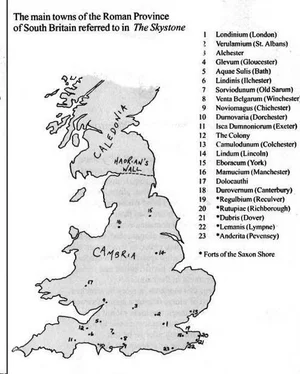"Caius Britannicus wouldn't approve. " Equus sounded almost condemnatory.
"No, " I agreed, "he would not. Not of the means, at any rate. The end he might applaud. "
"You think the end justifies the means, Varrus?" I turned and looked Tertius straight in the eye. "I couldn't care less. I just want Seneca stopped, and I don't want Caius Britannicus to hear anything about this until it is over. Do you both understand that?" They nodded, and Pella scratched his upper lip reflectively with the tip of one finger.
"You know, " he said quietly, "I've got good reason to hate Seneca, knowing the animal killed my son, but you, Publius Varrus, you don't like the man at all, do you?"
"That's as good a way of phrasing it as any, my friend, " I answered with a slight smile. "Go with God, Tertius. I'll look for good news on my return from the south. "
Pella was looking over my shoulder. "Here comes Caius Britannicus. Tell me, what do you think you're going to achieve at Stonehenge? Why are you even going? And who is this Celt, that he thinks he can summon Romans with a crooked finger?"
By the time Caius reached us we were well into a genuine discussion of the Stonehenge excursion, and the conversation flowed smoothly on from there. I felt only a small twinge of guilt at hoodwinking my friend Caius, but I knew that if I were successful, he would enjoy it. And besides, my anticipation of vengeance on Seneca left little room for guilt or regret. Four days later, I found myself remembering that meeting and the hazy summer heat of that afternoon with nostalgia. I was cold and I was wet. And I was unimpressed by the fact that the great, lichen-crusted stone column against which I rested my back had been standing in this place for thousands of years. In front of me, the rolling hills of the great plain of Sarum fell away in swooping waves until they were shrouded in the drizzle that hid the horizon in every direction and defied the eyes to tell where the sky ended and the ground began. There were times when Caius's beloved Britain left much to be desired. We had been here for hours, and so far there was no sign of Ullic and his Celts.
I suppose we had made a fine sight as we approached Stonehenge, but there'd been no one there to see us. The massive temple stood empty, outlined against the late afternoon sky. Caius and I were on horseback, leading two wagons bearing gifts for Ullic, and we were accompanied by a full maniple of men, arrayed in their finest trappings.
We had come late on purpose, but when we saw the great temple deserted, Caius was piqued and prepared to be angry. Seeing his mood, I was able to tease him out of it, pointing out that we had merely been outmanoeuvred, and so we camped for the night close by the temple itself, posting guards all around our perimeter. Caius had made a conscious decision, against all his training and better judgment, not to dig fortifications around our camp. We were, after all, on an embassy, and he felt strongly that this was a time for discretion, both in appearance and in deportment.
When Ullic Pendragon and his people arrived at last, at dawn, they made a spectacular entrance. They came in silence broken only by the hooves of their ponies and the squeaking wheels of Ullic's barbarously magnificent wagon.
He must have had five hundred warriors with him, many on foot, some mounted on shaggy little hill ponies with their feet reaching almost to the ground. All of them seemed dressed for war in a welter of garish colours. Ullic himself was a giant of a man, a full head taller than me. The big Celtic chieftain wore a leather helmet on his head, studded with iron, with armoured flaps that came down over his shoulders. But it was the decoration of his helmet that caught my attention. The head of a golden eagle crowned the front of it, the eyes, bright and alive-looking, glaring out at the world above the savage beak. I wondered how it had been preserved to look so lifelike, and how it was attached to the helmet beneath the ruffled neck feathers. The folded wings were fastened to the sides, and when he turned his head to look at one of his men I saw the spread tail feathers fanned out over the nape of his neck.
Caius had drawn our men up in two ranks, at attention, and I flattered myself they looked as right as Romans ever had. Each wore a plain bronze helmet and a breastplate of hardened leather. A sword belt and a skirt of leather straps studded with iron hung from every man's waist. Beneath his armour, each wore a plain white tunic that reached to just above his knees, and breeches of soft leather. On their legs they wore greaves and on their feet heavy, hobnailed, sandalled boots. Each wore a heavy cloak of homespun wool, and each held a spear and a heavy shield, the Roman soldier's scutum.
Ullic dismounted from his wagon and approached, letting us see his dress. He was swathed in a huge, red cloak, trimmed with animal fur. Barbaric jewels glittered on his breast and his legs were covered by long breeches, crisscrossed with leather bindings. His tunic was belted at the waist by a thick cord woven with what looked like gold, and both tunic and breeches were the same red as his cloak. The man was utterly splendid — and barefoot. He stopped three paces from where I stood with Caius and looked us both up and down, from head to foot.
Caius was wearing a toga-like cloak, and I suddenly wished I had worn mine. But then he looked more closely at my clothes and I felt better. I was wearing a suit of finely worked leather that, in spite of its luxurious appointments, still managed to retain a military appearance. On my left arm I wore an arm-guard of solid silver, laced with thongs — a decoration, but a useful one, since it protected my arm against my bow string. The Chief eyed this, then ran his eyes along the ranks of our men. His eyes were bright blue and his beard and moustache were black, shot through with grey.
He looked again at Caius and finally broke the spell of silence. He spoke, his voice the rumbling sound of water in a cavern. I understood not a word. He raised a hand and snapped his fingers and Cymric stepped forward from the ranks of Celts and came towards us. Ullic spoke again. Cymric looked into my eyes as though we two had never met, and then turned to Caius.
"The King says, 'Let us talk. ' "
"King?" Caius replied, blinking in surprise. "I did not know he calls himself King!"
Ullic raised an eyebrow and Cymric rattled on in Celtic. The King frowned slightly, seemed to consider this, snapped out a word or two and then turned away and walked towards the temple.
"Come!" Cymric beckoned to us both. "Leave your men here. " Caius turned to our soldiers. "Hold your ranks!" Outnumbered as we were by four to one, we did as we were bidden and followed Ullic, who stopped to allow us to catch up. We walked in silence right into Stonehenge and I realized that, apart from Ullic, Cymric and Caius, none of the six hundred or so men gathered outside had said a single word.
We stopped in the centre of the massive temple, and Ullic turned to face us. It occurred to me that I had never been at such a loss for words, not even with the Emperor Theodosius, and then it struck me forcibly that I had seldom been in the company of such a man as this. The surprising word that came to me was regal; this man truly was kingly.
"So, Roman!" He was glaring, narrow-eyed, at Caius. "You are surprised that I am a king. Why?"
He spoke in Latin. Caius looked at me in surprise, and then turned back to him. I did not know the temper of this man, but I hoped Caius would be forthright.
"We —" Caius's voice was husky. He cleared his throat angrily and spoke again, this time with his own voice. "We once had kings in Rome. We threw them out, abolished them. "
"You abolished them? Why?" His voice was soft.
Caius looked him straight in the eye. "They were unworthy. They used their kingly power to subjugate the people. "
Читать дальше









